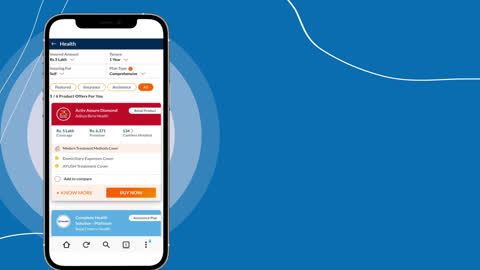Preventing LAMA requires a proactive approach that addresses the root causes of the issue. Here are some effective strategies for healthcare providers:
- Provide financial support options: Many patients leave due to financial constraints. Offering information about affordable health insurance plans can help mitigate this issue. For instance, Bajaj Finserv facilitates access to a range of health insurance plans from leading insurers These plans offer benefits such as:
- Premiums starting at Rs. 9.3/day.
- Sum insured options ranging from Rs. 10 lakh to Rs. 50 lakh.
- Cashless treatment at over 10,000 hospitals.
By educating patients about these options, hospitals can ensure that financial concerns do not hinder treatment. Get quotes for insurance plans with comprehesive coverage.
- Enhance patient education: Patients are more likely to stay when they understand the importance of completing their treatment. Clear communication about treatment plans, expected outcomes, and potential risks of leaving early can empower patients to make informed decisions.
- Foster trust through cultural competence: Training staff to understand and respect cultural differences can improve patient-provider relationships and reduce mistrust.
- Offer flexible care solutions: For patients with personal obligations, hospitals can explore options like day-care procedures or outpatient services.

Legal and ethical considerations in LAMA cases
When patients choose to leave against medical advice, healthcare providers must navigate complex legal and ethical challenges.
- Respecting patient autonomy: Patients have the right to make decisions about their healthcare, even if those decisions go against medical advice. However, it is the provider’s responsibility to ensure that patients are fully informed about the risks involved.
- Documentation and consent: Hospitals must document the patient’s decision to leave and obtain signed consent forms to protect themselves from potential legal liabilities.
- Legal consequences for patients: While there are generally no direct legal consequences for patients who leave against medical advice, their decision can impact their health outcomes and insurance claims. For example, some insurance policies may not cover complications arising from incomplete treatment.

Role of effective communication in reducing LAMA incidents
Effective communication is a cornerstone of preventing LAMA cases. Here are ways healthcare providers can improve communication:
- Active listening: Understanding a patient’s concerns and addressing them empathetically can build trust and reduce the likelihood of them leaving.
- Clear and transparent explanations: Use simple language to explain medical conditions, treatment plans, and associated costs. Avoid medical jargon that may confuse or overwhelm patients.
- Involving family members: Including family members in discussions can provide additional support and help patients make informed decisions.
- Leveraging technology: Digital tools like patient portals can provide easy access to medical records, treatment plans, and insurance options, fostering transparency and trust.

Conclusion
Patients leaving Against Medical Advice is a multifaceted issue that requires a comprehensive approach to address. By understanding the reasons behind LAMA, its impact, and implementing effective strategies, healthcare providers can improve patient retention and outcomes.
Health insurance plays a pivotal role in reducing financial barriers that often lead to LAMA cases. Bajaj Finserv simplifies access to a variety of health insurance plans from leading insurers, ensuring that patients can choose coverage that suits their needs. With features like cashless hospitalisation, coverage for pre-existing diseases, and tax benefits under Section 80D, these plans provide a financial safety net during medical emergencies.
Explore and compare health insurance plans on Bajaj Finserv’s platform today to secure your health and peace of mind.













